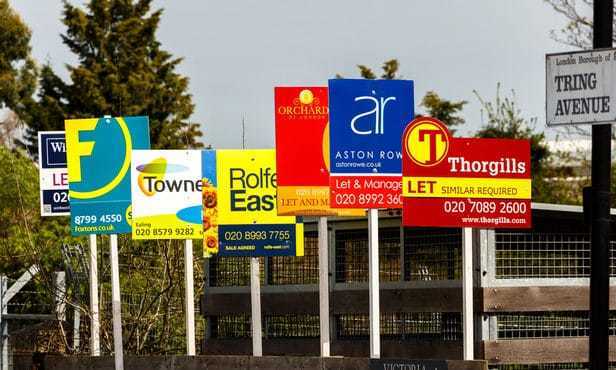The rental market in the UK is experiencing a frenzy of activity, as letting agents report an average of 25 enquiries from prospective tenants for every property on offer.
The chief executive of the National Residential Landlords Association (NRLA), Ben Beadle, says the figures come as landlords see their lowest profits since 2006 and there are ‘no winners’.
Letting agents have seen a staggering increase from the eight enquiries per property they were getting at the same time in 2019, and higher than the 20 enquiries they received in May this year.
The data, released by Rightmove, shows how competitive the rental market has become, as tenant demand outstrips supply across the country.
According to the property platform, the number of properties available to rent has dropped by 35% compared to 2019, although it has improved by 14% since last year.
Most sought-after rental property types
The most sought-after rental property types are two-bedroom semi-detached houses, followed by two-bedroom terraced houses, with smaller properties facing more pressure from the demand and supply gap than larger ones.
Ria Laitmer, lettings manager at Clarkes agents in Bournemouth, said “the gap between high demand and a severe shortage of rental stock at the moment is just crazy. We’re receiving mounting enquiries for each property to rent from would-be tenants, with queues of tenants arriving to open-house viewings and the majority being left disappointed as there is just not enough properties on the market to meet the demand.”
‘Massive supply and demand imbalance’
Speaking on BBC Radio 4’s Today programme, the NRLA’s chief executive Ben Beadle said “we have a massive supply and demand imbalance if we have got 25 people queueing around the block for one property, that is something that isn’t normal.We have a million people waiting for social housing and the PRS is housing far more people than it was intended to do. We know that demand is white hot, and we also know and it’s all well and good for the government to pick a fight with the private rented sector, but the PRS is housing many more people than it was intended to do.”
Landlords would pay less tax
The presenter read out a government statement issued in response to the Rightmove news saying that landlords would pay less tax due ‘thanks to our cuts to stamp duty and landlords can claim tax relief on financing their property purchase and day to day costs incurred when letting out, replacing furniture etc, and we are increasing the supply of affordable homes by providing money for that’.
Mr Beadle said "the government was being ‘disingenuous’ and pointed to Section 24 which means landlords cannot offset their mortgage costs which has made some properties ‘no longer a going concern’. What we have seen is a relentless kicking for the past decade to make renting a property out much less attractive so it should be no surprise that see these figures.”
Mr Beadle also pointed out that landlords are taking home their lowest profits since 2006 and ‘there are no winners here’.
Renters face ‘bleak’ future as average rent hits record high
Renters in the UK are facing a ‘bleak’ future as the average rent price has reached another record high of £1,276 in September 2023, according to one index.
The data from HomeLet, the tenant referencing and insurance provider, reveals that the average rent price in the UK has increased by 8.9% since September 2022, and by 1.38% since August this year and its chief executive says he doesn’t ‘hold out much hope’ that a solution to fast-rising rents will be found soon.
Excluding London, the UK average is now £1,061, up 8.15% from last year and 1.34% from last month. London’s average monthly price has increased by 1.59% from last month to £2,179, 12.03% higher than in September 2022.
The capital continues to be the most expensive region to rent in the UK, with rents more than double the national average.
Homelet’s chief executive, Andy Halstead, said “excluding Scotland and the West Midlands, monthly rent has increased month-on-month across the UK yet again – painting a bleak picture for many tenants. In Northern Ireland alone, we’ve witnessed a 4.16% month-on-month increase in rental prices compared to August, pushing the average monthly rental price up to £876pcm. Clearly, this cannot be sustained, but it’s just one example of the chaos caused when governments intervene without fully understanding the market. In short, a solution needs to be found – and quickly, I do not have much hope. Interestingly, there has been a reduction in month-on-month rents in two regions. In Scotland and the West Midlands monthly rent has decreased for the first time since January 2023, -0.81% and -0.53% respectively. The first change in the market for a long time, let’s watch this space.”
Every region in the UK has seen an annual rent increase, with Scotland showing the largest growth of 13.34% to £977. The North East of England remains the cheapest area to rent in the UK, at just £668, but still up 6.37% from last year.
Average rents in Wales rose to £852, 1.19% higher than last month and 7.3% higher than September 2022.
Northern Ireland saw the highest monthly increase of 4.16%, pushing the average monthly rental price up to £876.

